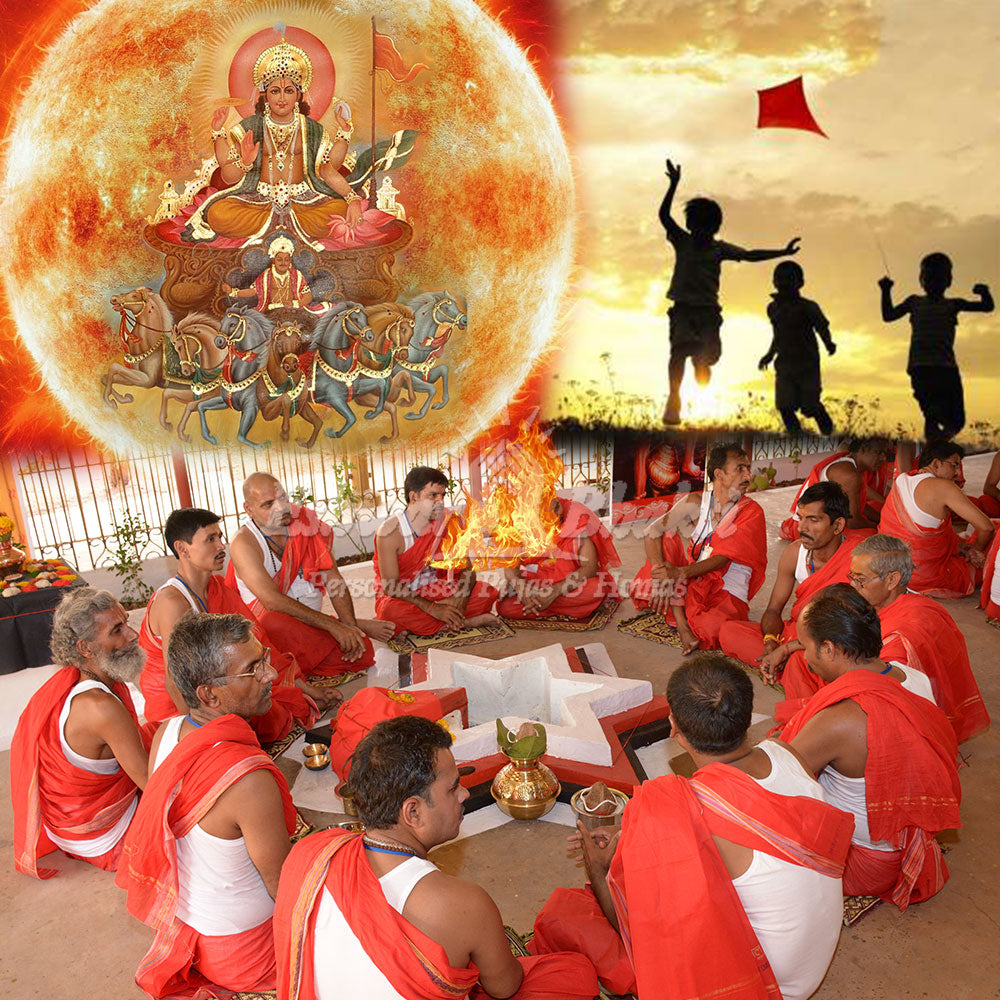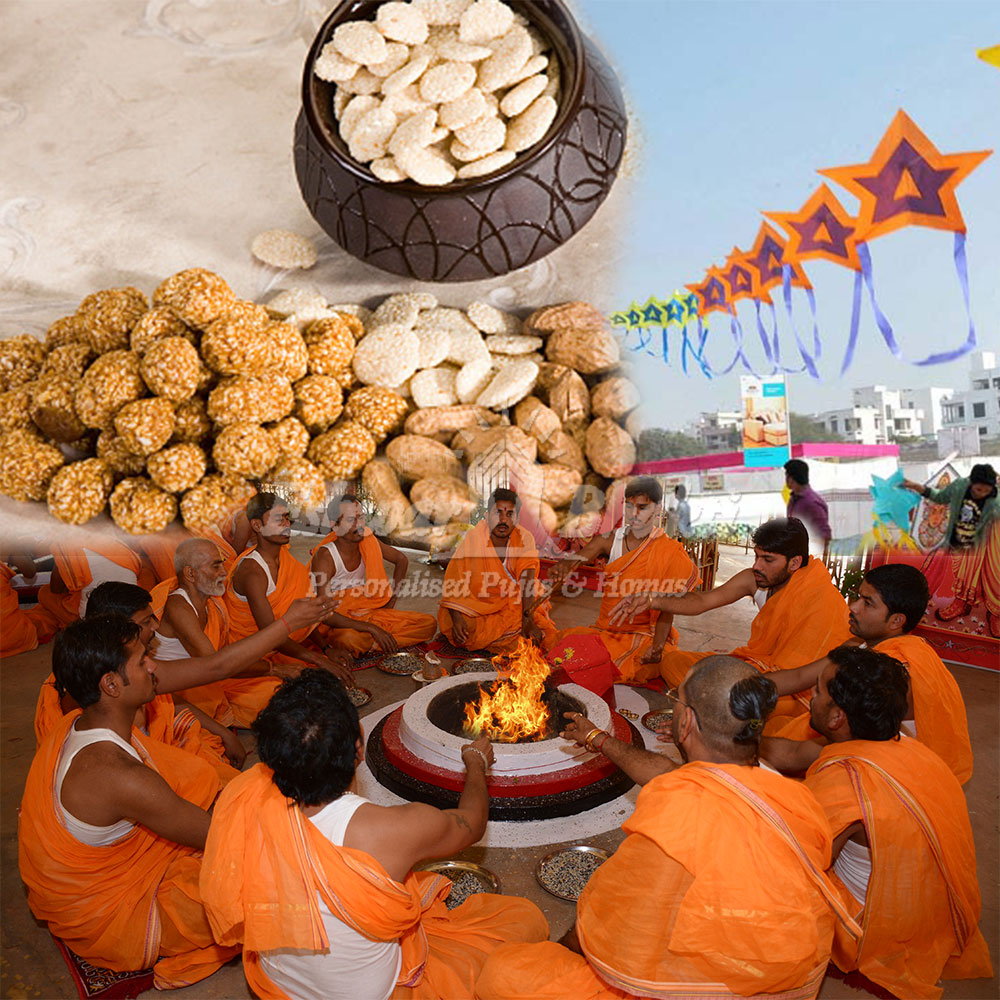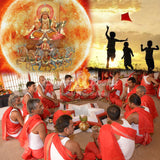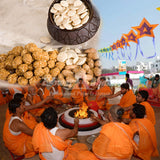





Makar Sankranti Puja and Havan
For power, valour, wisdom, growth and removing obstacles
- $300.00
- $300.00
- Unit price
- Fees: per
Makar Sankranti puja is done for power, valour, wisdom, growth and removing obstacles.
Makara Sankranti is the day when the Sun begins its movement away from the Tropic of Capricorn and towards the northern hemisphere and thus it signifies an event wherein the Sun-God seems to remind their children that 'Tamaso Ma Jyotirgamaya'—may you go higher and higher, to more and more Light and never to Darkness.
The Sun stands for knowledge, spiritual light and wisdom. Makara Sankranti signifies that we should turn away from the darkness of delusion in which we live, and begin to enjoy a new life with bright light within us to shine brighter and brighter. We should gradually begin to grow in purity, wisdom and knowledge even as the Sun does from the Day of Makara Sankranti.
As per the Legend, Sankranti is considered a Deity. According to a legend Sankranti killed a demon named Sankarasur. The day followed by Makar Sankrant is called Kinkrant or Karidin. On this day, the female deity (devi) slayed the demon Kinkarasur.
The famous Gayatri Mantra, which is chanted everyday by every faithful Hindu, is directed to Sun God to bless them with intelligence & wisdom. Sun not only represents God but also stands for an embodiment of knowledge & wisdom. Lord Krishna reveals in Gita that this manifested divinity was his first disciple, and we all know it to be indeed a worthy one too. No Sundays for the Sun, may be because one who revels in its very 'being', the very essence of his own Self, is always in the Sunday mood.
The co-relation of cosmic events with individual life and values is one of the most astounding traits of Hindu Masters. Once this co-relation is brought about thereafter these cosmic events become instrumental to remind us the best which we cherish & value. Of all the cosmic bodies Sun is the most glorious & important, thus every sun-centric cosmic event became very important spiritual, religious & cultural events.
The Puranas say that on this day Sun visits the house of his son Shani, who is the swami of Makar Rashi. These father & son do not ordinarily get along nicely, but inspite of any difference between each other Lord Sun makes it a point to meet each other on this day. Father in fact himself comes to his son’s house, for a month. This day symbolized the importance of special relationship of father & son. It is the son who has the responsibility to carry forward his fathers dream and the continuity of the family.
On the day of Makar Sankranti, from sunrise to sunset, the environment has more chaitanya (Divine conscious-ness); hence those doing spiritual practice can benefit from this chaitanya.
Puja service includes: Sthapana (Ganesh, Devi, Navgraha Kalash, Brahma), Swasti Vachan, Sankalp, Ganesh Pujan, Navgraha Puja, Invocation of major Gods, Brahman Varn, Purush Sukta – 108 recitations, Surya Atharvasirsha - 108 recitations, Ganpati Atharvasirsha - 108 recitations, Ram Mahamantra Jaap - 5000 chants, Yagna, Aarti, Pushpanjali, Donation & food to brahmins.
Number of priests: 5
Duration: 1 day (14-January)
Eshwar Bhakti priests will perform your Puja as per the Vedic procedure. Please mention your birth details (name, date, time, and place of birth), & Sankalp (your wish) at checkout. This is an individual Puja (you may book puja only on your name or include your near/dear ones in your puja).
You can book this puja with or without a DVD. An hour-long DVD will have the main elements of your puja: Sankalpa, Abhishek or invocation mantras, presiding deity mantra chants, Homa and Aarti. If you opt for a DVD, we will upload it on a cloud link for you to download and watch online, within a week of your puja completion. If you don't opt for a DVD, we will email few short video clips and photos immediately upon successful completion of your ritual.
Performing your puja ritual with love and utmost care is our motto. We perform only Individual Personalized rituals. No group rituals. Here are the key steps to help you understand the process:
- You add a ritual to your shopping cart, after reading the benefits and based on your concerns.
- At the time of booking your ritual(s), you are asked to provide your "Name, birth details, Sankalpa and instructions" on the shopping cart page. You can also mention your Gotra, Nakshatra and Rashi details there (if you know).
- Immediately after the receipt of your order, we start identifying the most auspicious date and time to perform the ritual.
- An email is sent to you within 12 hours of order confirmation, which would comprise:
- Date on which your puja would be performed.
- Complete timings and duration of your ritual.
- Sankalpa time: When you can join us and pray for the fulfillment of your wish.
- Zoom meeting details for taking the Sankalpa.
- Mantra and meditation instructions to follow at your end.
- Dietary precautions on the day of your puja.
- List of some easy to get items, to take the Sankalpa.
- You can also email us your photo, at contact@pujayagna.com, to keep during the performance of your puja (optional).
- On the scheduled day and time, you can join over Zoom to take your Sankalpa (optional). You will be guided during the call to take the Sankalpa.
- Immediately after the successful completion of your ritual, an email is sent with photos/videos of the ritual.
- In case of rituals lasting over several days, you will receive daily updates over email, WhatsApp or Viber.
Have more queries, read Frequently Asked Questions.
 Related Pujas
Related Pujas
- From $300.00
- From $300.00
- Unit price
- Fees: per
- From $300.00
- From $300.00
- Unit price
- Fees: per
- From $300.00
- From $300.00
- Unit price
- Fees: per
- From $300.00
- From $300.00
- Unit price
- Fees: per
- From $300.00
- From $300.00
- Unit price
- Fees: per
- From $300.00
- From $300.00
- Unit price
- Fees: per
- From $300.00
- From $300.00
- Unit price
- Fees: per
- From $300.00
- From $300.00
- Unit price
- Fees: per
- From $300.00
- From $300.00
- Unit price
- Fees: per
- From $300.00
- From $300.00
- Unit price
- Fees: per
- Choosing a selection results in a full page refresh.




